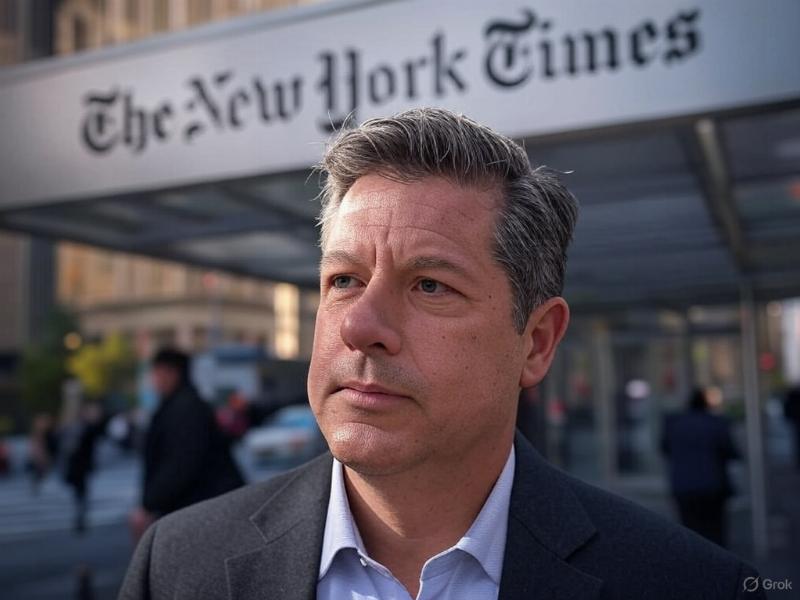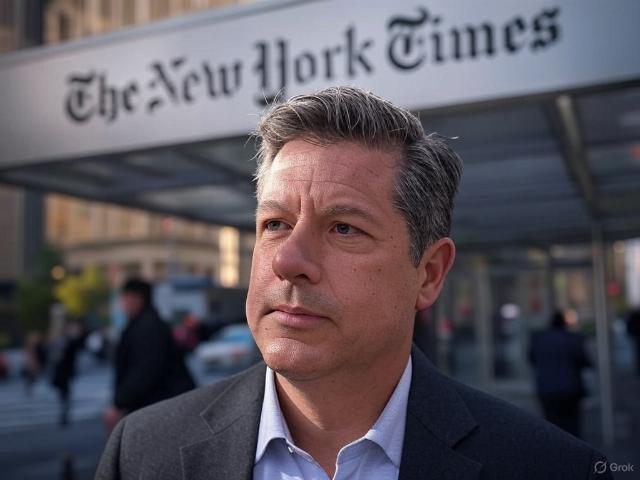


A Harvard sophomore, Alex Bronzini-Vender, had a NYT op-ed published Tuesday morning lamenting the changing fashions in college application essay questions. Even though he’s already in, young Mr. Bronzini-Vender has evidently heard from incoming freshmen what they had to endure to get in. What changed? Well, evidently the essay question is no longer on DEI, which he, a self-described “white” kid, apparently knew how to “game.” (His word.) Now? Now the essay question is to describe a conflict you once had and how you resolved it.
It’s known as the disagreement question, and since the student encampments of spring 2024 and the American right’s attacks on universities, a growing number of elite colleges have added it to their applications.
Note his assessment of “the American right.” From context, where he paired two events — “the student encampments of spring 2024 and the American right’s attacks on universities” — it seems he’s describing it an “attack” that the Trump administration insists that non-Jewish students not harass, intimidate, or terrorize Jewish students. He used the multiple — “attacks” — so it’s also possible he is referring to the anti-DEI measures the administration has taken, but either way, those pro-Palestine mobs, those “encampments,” were the furthest thing from “civil,” and “civility” will be a very important word in a moment. He goes on:
The trouble is that the disagreement question — like much of the application process — isn’t built for honesty. Just as I once scrambled to demonstrate my fluency in D.E.I., students now scramble to script the ideal disagreement, one that manages to be intriguing without being dangerous.
And what’s our young squire’s solution to this vexing “disagreement” question? Just get rid of it. Scrap it entirely. Why does he say to scrap the question? Because he believes it’s unproductive to “attempt to screen out incivility at the gate.”
I couldn’t disagree more with this young man. Had “incivility” been screened out “at the gate” prior to the “spring of 2024,” the decidedly uncivilized, anti-Semitic mobs and encampments would not have had fuel, or at least less oxygen. And as regards the “disagreement question,” I say to Mr. Bronzini-Vender: If you’re not able to conduct yourself in a civilized manner — in writing! — by the age of 18, when you have all the time in the world to pre-meditate and “game” out both sides of a disagreement in which you are arguing with yourself, you are either incapable of or un-desirous of civility.
He suggests schools look “inward,” which we will address shortly, but I would suggest to this young man that he, too, look inward. If you can’t mount a civil argument with yourself, that’s on you and most importantly, your parents for not challenging you to defend yourself or your ideas. One wonders if this young man’s parents ever asked him a simple question over dinner: “Why?” Was he ever taught how to think or merely what to think? He writes:
They [universities] need to look inward. Undergraduate education too rarely puts students in a position where substantive disagreement is expected, facilitated and taken seriously. Instead of granting themselves more and more opportunities to tone-police admissions files, institutions should reinvest in disciplines like philosophy, history and political theory that teach people how to reason through disagreement and should equip faculty members to lead hard conversations constructively.
Since the overwhelming majority of “philosophy, history, and political theory” faculty are progressive, this seems unlikely, as preening indoctrination is the coin of the realm, not debate. And progressives, particularly young ones, don’t debate; they scream. Or cry. Or both. So not screening for civility “at the gate” while simultaneously encouraging progressive faculty — already disinclined to argument — open up a classroom debate is a sure recipe for disaster. Somebody will end up in tears. Probably in the dean’s office. Parents will be called in, and assurances will be made that “this sort of thing will never happen again.” Debate experiment over. You can just see it happening.
But he’s not done. Here’s where he goes really wrong. Like 180 degrees wrong:
That kind of work [difficult class discussions] won’t appease the American right. It involves engaging, not punishing, the ‘woke’ students and professors whom many in the Trump administration view as enemies.
“Punishing the ‘woke’”? Define “punishing.” Explaining you are wrong about something and then demonstrating why? Because often, that’s what progressives mean when they use the word “punishing.” This young man couldn’t be further from the truth! Conservatives love a good debate! You know why? Because we’re right. We know we’re right. We have the serenity of someone who is right. And we can patiently, confidently outwit, outmaneuver, and point-by-point, demonstrate it. Please, please let us debate. We’d be happy to!
It seems important to note that once again he “others” the “American right.” He uses the word “appease,” which is traditionally used in relation to an enemy of the state. And again, I remind him of his seeming affection for the “spring 2024” campus mobs and the encampments — which were the furthest thing from “engaging” in a “civil” disagreement. It’s now fair to assume that this young man has never had any kind of meaningful interaction with a conservative. He goes on:
First, diversity; now civility. Maybe it’ll be patriotism next. As long as that persists, we’ll keep tailoring our answers, some of us aided by tutors and consultants who specialize in knowing what colleges want, all of us hoping we’ve guessed right.
“Maybe it’ll be patriotism next,” he sneers. You can just hear the sneer.
So let’s review: DEI? Knowing how to “game” admissions. “Disagreement”? “Civility” is too much to expect of 18-year-olds, he says. And now “patriotism” would be a cross to bear. He’d have to “game” that too, evidently.
This kid, who who tells us in his op-ed that he got a private school education before he ever got to Harvard, and who’s got the world by the tail getting that Harvard education, can’t muster the tiniest bit of gratitude to be living in the freest country on earth which made it possible for his parents to provide him with all that?
Might I suggest to this young man that his problems with patriotism are related to his problems with civility: a lack of gratitude. He should be made mindful of how incredibly lucky he is to, among other things, get an op-ed published in The New York Times. Honestly, when I think that the men who founded this country were barely older than this young gent, yet managed to forge 250 years of lasting liberty, while this kid is struggling to be civil arguing with himself, I weep.
All I’ve taken away from his lament is that he has a lot of growing up to do, and his parents, while surely and justifiably proud of their young man, should’ve done a better job preparing him to live in civil society with people who may not think the sun rises and sets on his shoulders. They’ve done him no favors letting him leave the nest this ill-equipped, ungrateful, and weak.

Image from Grok.
